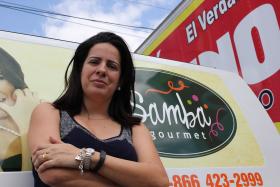
Doral woman a victim of anti-Chavista witch hunts
By Tim Padgett
Pietra Diwan takes pride in the master’s degree she earned in history back in her native Brazil. But a passion for historical accuracy may cost her the business she built here in South Florida.
As a historian, Diwan pays attention to document details. That’s why she raised flags last month when Venezuelan friends here started posting Facebook photos of the ongoing anti-government protests in Venezuela.
These were supposedly images of Venezuelan government brutality. But Diwan noticed that many of the Facebook pictures were actually from unrest in places like Syria and Ukraine. So she mentioned it on her own Facebook account.
“We have to make sure the information is right,” Diwan says. “I think [otherwise] they can lose their credibility.”
But Diwan lives in Doral, which has one of the largest Venezuelan communities in the United States. It almost uniformly opposes Venezuela’s socialist regime, which most expatriates blame for the country’s economic crisis and violent crime plague.
As a result, rather than take the bogus photos down, some of Diwan’s Venezuelan friends lashed out.
Including Alexandra Pirela. She began leaving voicemails calling Diwan a frustrated communist and a Chavista – a supporter of the Venezuelan government and the leftist revolution founded by the late Hugo Chávez.
Diwan insists she’s nothing of the sort. No matter. Pirela, according to social-media postings viewed by WLRN, then embarked on a public campaign to smear Diwan and boycott her Miami business, Samba Gourmet, which sells popular Brazilian sweets called brigadeiros.
Within days, angry Venezuelan-Americans here and even in states like Texas were posting their own attacks against Diwan:
From Pirela: “These are the Brazilian sweets made by a communist here in the USA. We Venezuelans should not support this kind of people anywhere in the world.”
From Jesse Chirinos, a massage therapist in Austin, Texas: “Damn communist! And in Miami, too! We will boycott you and get you deported from here. We know who you are. If you want to be a Chavista, Cuba is waiting for you.”
From Doral resident Miguel Grosso: “These people make their money robbing from Venezuelans.”
Pirela, who has moved to Houston, did not respond to WLRN interview requests. But her boycott has had the intended effect. Some of Diwan’s local clients, including a restaurant chain, have decided to stop selling Samba Gourmet products for the time being, and she has had to temporarily shut down the business.
Worse, Diwan says, are the online threats, which also have her worried about the safety of her husband and 6-year-old daughter.
Diwan says her attackers are “looking at this as a war. I know in war you don’t have rules. But you’re in America, and here we have rules.”
Her case isn’t isolated. Boycotters also insist, for example, that a high-end restaurant in Coral Gables is owned by the son of Venezuela’s Supreme Court president. And that the owners of a Doral sushi restaurant are supposedly relatives of Venezuela’s First Lady, Cilia Flores.
In each of those cases, however, the claims appear to be patently false.
That sort of witch-hunt approach – the boycotters are especially on the prowl for high-profile Chavistas investing corrupt cash in South Florida – troubles Venezuelan community leaders like Luis Ramírez, president of the Coral Gables-based Venezuelan-Ameican Chamber of Commerce.
“It is just the kind of thing we came [to the U.S.] to avoid – unjust treatment,” says Ramírez. “If we have any suspicion that somebody’s investment here in the U.S. is not legal, I would urge the people to go to the institutions, like the police.” And not, he adds, to social media.
Ramírez insists boycotts like the one against Samba Gourmet aren’t representative of the Venezuelan diaspora as a whole. And he’s most likely right.
LIBELOUS BEHAVIOR?
But while Diwan says she understands the complaints against Venezuela’s authoritarian government and its controversial president, Nicolás Maduro, she is considering legal action. Victims like her, she argues, have to prevent what she calls libelous behavior from metastasizing.
“I think they have all rights to protest,” she says. “But I don’t think they have the right to involve innocent people or be so blinded. What they are doing is wrong.”
And to many observers in Miami, it’s déjà vu – reminiscent of personal attacks suffered a generation ago by anyone who dared disagree with the hardline Cuban exile community.
“Unfortunately a pattern has been established [in the Venezuelan community] where there’s an intolerance for other points of view,” says Elena Freyre, a Cuban-American who heads the Foundation for Normalization of U.S.-Cuba Relations, which is hosting a national conference in Miami this Saturday. “If you’re talking democracy, you need to respect that democracy.”
Diwan insists she’s walking that talk. And she hopes her defiant stand will get the social media mongers in Venezuelan enclaves like Doral to start walking it too. Or else lose historical credibility.
(From WLRN – Public radio in Miami)
[Photo of Pietra Diwan by Tim Padgett/WLRN]

